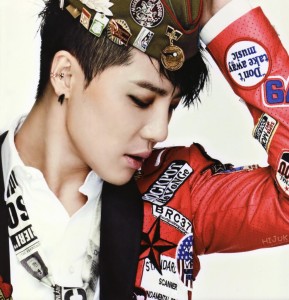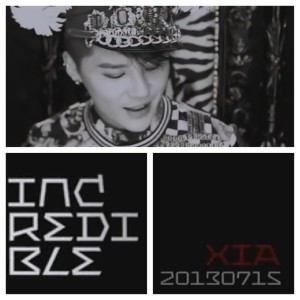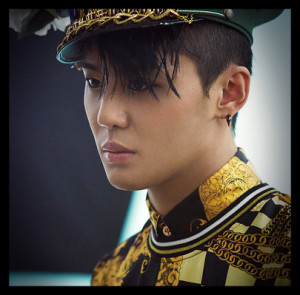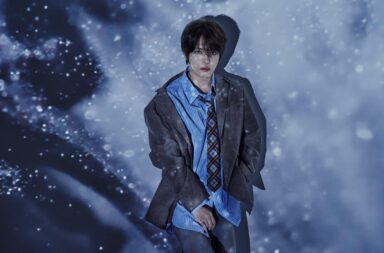 When it comes to Kim Junsu’s albums, I usually end up having to attempt (keyword: attempt) to divorce my love for his voice from my “objective” perception of the music, because they are often at odds with the each other—as evidenced in his first solo effort Taranatallegra. To put my objective feelings about that album lightly, “incredible,” it most certainly was not. However, to answer whether Incredible is worthy of the title “incredible” is really a matter of figuring out what “incredible” means to us as a listener. If I’m a fan of Junsu to the point Junsu singing “Twinkle, Twinkle Little Star” is the most gorgeous thing ever, then I would love Incredible before I even heard it. In this case, “incredible” becomes a reflection of Junsu the singer as opposed to the music he puts out—which is fine, provided that it’s what you want out of a record. A voice.
When it comes to Kim Junsu’s albums, I usually end up having to attempt (keyword: attempt) to divorce my love for his voice from my “objective” perception of the music, because they are often at odds with the each other—as evidenced in his first solo effort Taranatallegra. To put my objective feelings about that album lightly, “incredible,” it most certainly was not. However, to answer whether Incredible is worthy of the title “incredible” is really a matter of figuring out what “incredible” means to us as a listener. If I’m a fan of Junsu to the point Junsu singing “Twinkle, Twinkle Little Star” is the most gorgeous thing ever, then I would love Incredible before I even heard it. In this case, “incredible” becomes a reflection of Junsu the singer as opposed to the music he puts out—which is fine, provided that it’s what you want out of a record. A voice.
To be candid, I’ve been grappling with multiple issues when it comes to arguably “incredible” singers expressing themselves in the form of mediocre pop albums (in context of the vocal ability of the singer). Not only does it provide no platter for the vocal nuances of the singer, it just leaves me underwhelmed on a constant basis. Admittedly, my high perceptions of a voice quickly translate to almost impossibly high expectations for said singer’s record. For me, having an exceptional voice is only the base for constructing exceptional music. I would never condone wasting talent on covering up uninspired and bland songwriting.
 On the other hand, maybe it’s wrong for me to associate carbon-copy music with lesser singers. In fact, what singers like Junsu and Ailee do best is elevate what could come off as dry and boring through ornate execution. But is that in itself “incredible”? No, not really. Impressive and worth analyzing for sure, but not incredible; it’s not something for which I would drop everything I was doing and just to breathe in and fawn over every minutiae in its craftsmanship. Though Incredible may be precise in its execution, it unfortunately remains somewhat diluted in its innovative quality, and thus becomes part of the aforementioned group.
On the other hand, maybe it’s wrong for me to associate carbon-copy music with lesser singers. In fact, what singers like Junsu and Ailee do best is elevate what could come off as dry and boring through ornate execution. But is that in itself “incredible”? No, not really. Impressive and worth analyzing for sure, but not incredible; it’s not something for which I would drop everything I was doing and just to breathe in and fawn over every minutiae in its craftsmanship. Though Incredible may be precise in its execution, it unfortunately remains somewhat diluted in its innovative quality, and thus becomes part of the aforementioned group.
No, Incredible is not all that incredible in the most literal of meanings, but does have its moment of genius via the most jaw-dropping yet minimalistic song released this year: “11AM.” I usually hate taking songs out of order in an album, because it tends to pry away the context in which all the songs exist within the greater piece; however, “11AM” is an exception to this, because it truly is “incredible” in every sense of the word. This is a song I didn’t think could exist, a song so raw that Junsu’s vocals are everything.
The delicate piano serves as the forward momentum for the vocals, and the pauses exist to let the listener breathe after the density of each cadence. It’s the kind of song that only succeeds on the vocal capacity of the singer alone, and while I sound like I’m contradicting myself after attesting that song should come before singer, that’s not really the case here. “11AM”‘s composition revolves around and embellishes the voice as opposed to being a flimsy composition that needs the support of the singer to survive—in a sense, it’s analogous to comparing a crystalline object with a plastic object.
[youtube http://www.youtube.com/watch?v=xDNvpCN1vDs]Out of every JYJ act so far, Incredible has, without a smidgen of doubt, the best production I have ever seen from a CJeS release. It’s such an improvement, that I was actually incredulous of the album’s origins and threw out ridiculous theories (i.e. alien abduction) as to how CJeS managed to finally put the money where it mattered—the music. If I had to pick out one element of Incredible that stood out most to me as a listener, it’s the transcendent sound that envelopes the album from first song to last (albeit there are a few blips along the way). Incredible is all about the collective experience, and that’s what keeps me interested through every song the album, whether or not I end up liking each one individually.
For this reason, “No Reason” is amazing as an electronic, RnB-esque opening track. It sets the tone for Incredible within the first few measures, and has a clear conceptual direction. Like most of the songs in Incredible, “No Reason” doesn’t boast stellar composition; however, it’s a slick song that beautifully strikes balance between emphasizing Junsu’s vocals and letting the synth create ambience. The push and pull between the fantastic and airy backdrop and the dynamics of the vocal line gives bite and drive to the song when it could quickly fall to the mundane.
“Rainy Eyes” is really the epitome of an RnB/Jazz ballad, and it’s a one that is probably only second to “11AM” in ballads for it lacks the artistry of the latter piece. What makes “Rainy Eyes” so great is how it is first a great song, and secondly Junsu’s song. I’ve been harping so much on song before artist, and “Rainy Eyes” is really the first example in album of how much of a difference it makes (and thankfully not the last). “Rainy Eyes”‘s stunning quality is not just from Junsu’s exceptional voice but also the impeccable use of horns, actual rain, and the lazy yet crisp drum line. Gorgeous on all fronts. Absolutely gorgeous.
[youtube http://www.youtube.com/watch?v=6PpJW4Rw7TY]“Sorry” is frankly not the kind of song I tend to appreciate, and as the song does little to innovate itself from cliched structure and overused orchestra, there’s not much I personally like about it. Musical histrionics are my pet peeve in K-pop, which is just a long-winded way to say that the Korean OST style is not something I generally enjoy. However, those who do take well to this particular genre will not be disappointed in the slightest, for what it actively tries to accomplish, it does extremely well. “Sorry” is a stark reminder that we’re still listening to JYJ-derived album and that we haven’t left Korea in any shape or form. In some ways, “Sorry” is really a grounding song in the album when so much of it is floating in the clouds.
“Chocolate Girl” is a personal favorite in the album, and takes on many of the same vibes as “Rainy Eyes,” but with a far more upbeat tempo. The song contains two things that always win big points with me: jazz, and nonchalance. Ease and style in singing, to me, is the most obvious indicator of vocal prowess. The beauty of a difficult ad-lib is often better expressed in de-emphasis, as there’s something thrilling about hearing a singer hit every note with finesse as though it was as easy as strolling in a park.
[youtube http://www.youtube.com/watch?v=oDuimNwtgUo]There are clear western influences littered across Incredible, though none are so obvious as “Incredible.” Despite the western color to the song’s composition, the fluid delivery of the song is decidedly Korean. This mix of musical cultures makes for great listening, and I find myself enjoying the song more and more as I continue to listen to it. While I still find the song to be underwhelming when considering what Junsu can do with a title track (see “Tarantallegra” or even better, “Intoxication”), what I appreciate about it is very much along the lines of Miyoko‘s interpretation. What I’m left with is a pretty favorable impression of the song, even if the whole package comes off as generic. But before we move on, let’s set the record straight: in my mind, there is no one named Quincy on this song, and there is no atrocious rap to speak of. None. Whatsoever.
“나 지금 고백한다 (Feat. 길미)” is yet another suave song on the album that I don’t quite love as much as some of the others, but I am a huge fan of the Gilme feature. The narration and light rapping style give such a friendly and approachable feel to the whole song as well as creating divide between this song and the other jazz influenced numbers across Incredible.
[youtube http://www.youtube.com/watch?v=Zw0di9h1NSg]“가지마” I could like just for the Celtic elements scattered around, despite the song being quite comparable to “Sorry.” Actually, “가지마” carries the kind of sound that I was hoping to receive from “Sorry” and never got. “가지마” still has that broad-stroked composition (complete with orchestra) that we have come to know so well in the ballad genre, but what makes this song palatable is that the flamboyance is toned down enough that I can really appreciate the elegance of the core melody. However, what I’d really like to gush over is how stunning the flute line is at the at beginning and how well Junsu conveys the overall tone of the song without dragging down everything though excessive vocal gymnastics. Everything just comes out naturally—no needless bells and whistles.
“Turn it Up” has the most ironic title in this album, because it sounds nothing like what one would expect. “Turn it Up” somewhat implies booming bass and house music, but that’s pretty much entirely absent in this song. Instead, we have what is arguably the worst song in the album, especially since the entire song is basically the same instrumental loop played over and over again. A loop in itself is not a problem; it’s when that loop is both directionless and overlaid with even more directionless vocals, that you end up with a boring song. The whole thing feels like a lazy effort, and probably took all of five seconds to throw together. As for Dok2‘s feature, it’s completely a waste of his rapping talents.
[youtube http://www.youtube.com/watch?v=zFa40ficWuI]“Fantasy” is probably my favorite song in the album, not because the compositon is all that novel, it’s for that incredible sax and how slick the sound is. In some sense one could consider “Fantasy” the “better version” of “Chocolate Girl,” though both have their individual merits. “Chocolate Girl” has a mellow jazziness with a lounge music feel; “Fantasy” relies on a more pop based sound that’s laced with intricate jazz elements. What makes “Fantasy” a superior track is that the instrumental is extremely strong, and actually gives Junsu a fight when it comes to dominance over the song. When both the instrumental and the singer are basically on even ground, the listening experience improves dramatically. You not only have to listen for how Junsu’s part is enhanced by the elements around it, you also have to take the instrumentation as an equally important element and listen for how Junsu’s voice enhances it in return. I mentioned the importance of “give and take” when talking about “No Reason,” but in “Fantasy,” it’s not just the “saving element” of the song—it’s the source of its sophistication. Unlike “No Reason,” “Fantasy” would sound great even if an average singer had released it. Having Junsu there only makes the track all that more awesome.
 After all the seriousness in the album, it’s quite surprising to listen to “이 노래 웃기지?(Narr. 붐),” a song that embodies “Junsu-ness” like no other and is certainly not subtle with advertising its contents. As much as I find the song hilarious and entertaining (Junsu literally jumps between sounding like a hyperactive kid and a person who has a scratchy voice from allergies—how can that not be funny?), hearing the song while going through the entire album is an experience that’s best described as taking a card castle and stomping it to the ground. Junsu spends all of this time developing the album only to have one song destroy all of it. I don’t think any less of the song for being so jarring within the album, but I’m not going to deny it destroyed the mood of both the songs previous and the songs after. In fact, this is a perfect case of a good (and exceptionally fun) song that is better off not being in the album. (I’d rather have seen it as an extra single for fans.)
After all the seriousness in the album, it’s quite surprising to listen to “이 노래 웃기지?(Narr. 붐),” a song that embodies “Junsu-ness” like no other and is certainly not subtle with advertising its contents. As much as I find the song hilarious and entertaining (Junsu literally jumps between sounding like a hyperactive kid and a person who has a scratchy voice from allergies—how can that not be funny?), hearing the song while going through the entire album is an experience that’s best described as taking a card castle and stomping it to the ground. Junsu spends all of this time developing the album only to have one song destroy all of it. I don’t think any less of the song for being so jarring within the album, but I’m not going to deny it destroyed the mood of both the songs previous and the songs after. In fact, this is a perfect case of a good (and exceptionally fun) song that is better off not being in the album. (I’d rather have seen it as an extra single for fans.)
“사랑하나 봐” is frankly boring. The melody is one-dimensional and there’s not much Junsu can do to make it interesting. The song is clearly filler, and most likely positioned to give reprieve between the nearly psychadelic “Is This Song Funny?” and the heavenly “11AM.” It’s really sad to see such a song come at the end, because it just has the “I ran out of ideas” vibe. Right before a song as nuanced as “11AM,” this kind of grogginess is particularly detrimental; I’m not going to come into “11AM” with the kind of vigor and perceptiveness that I should have for the song.
 Overall, Incredible is quite a safe album, sitting within the confines of what is easily likable. This is a much better outcome than in Tarantallegra, (which is neither safe, nor great,) though I’m a bit disappointed that Junsu is swinging his music between two extremes in presentation: one very mainstream, the other a tad outlandish/confused. What separates the two in the presentation sense includes one, production (which is pretty self-explanatory), and two, its lack of solid identity. Tarantallegra jumped between dance track and ballad in a blink on an eye, while Incredible creates better transition between the two styles by inserting some mid-tempos.
Overall, Incredible is quite a safe album, sitting within the confines of what is easily likable. This is a much better outcome than in Tarantallegra, (which is neither safe, nor great,) though I’m a bit disappointed that Junsu is swinging his music between two extremes in presentation: one very mainstream, the other a tad outlandish/confused. What separates the two in the presentation sense includes one, production (which is pretty self-explanatory), and two, its lack of solid identity. Tarantallegra jumped between dance track and ballad in a blink on an eye, while Incredible creates better transition between the two styles by inserting some mid-tempos.
The latter is clearly superior in both aspects, but the two things that Tarantallegra had that Incredible didn’t was a clear standout track (neither “Fantasy” nor “11AM” is quite what I’m looking for), and a clear indication that the sound of the album represented Junsu. “Tarantallegra” had oomph and understated pizzaz that made it such a great title track. On the other hand, “Incredible” is only fun. And while fun isn’t the same as bad, there’s not much that’s interesting about the song. In addition, the comprehensive album doesn’t quite feel like Junsu the way Tarantallegra did. He takes on a lot of new musical styles in Incredible, most of which I currently can’t quite associate with what I perceive his style to be. For the next go around, I hope that Junsu can strike a happy medium between the pros of Tarantallegra and Incredible and throw in a little innovation to create something truly “incredible.”
In any case, even if Incredible itself isn’t “incredible,” it sure is a fantastic album. Good job Junsu, I’m definitely looking forward to the next one.
Score: 4.3/5


